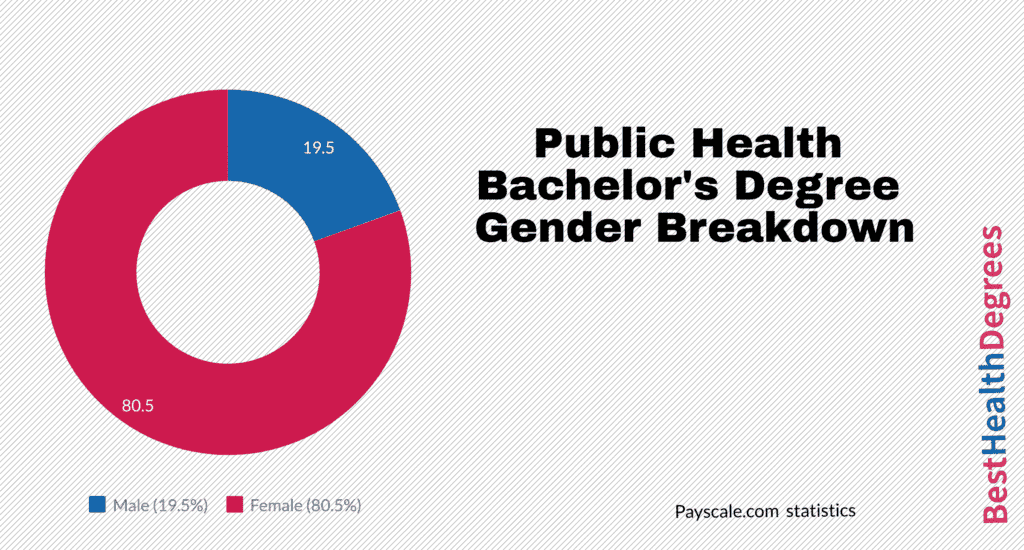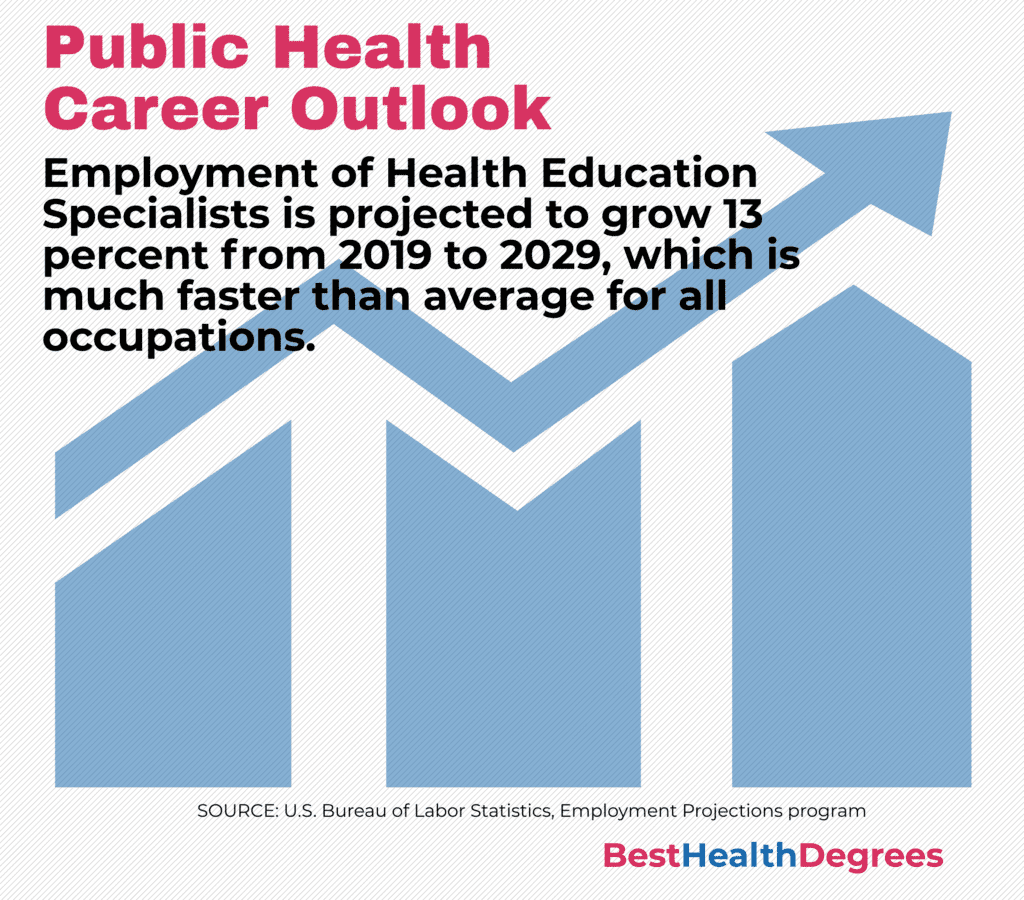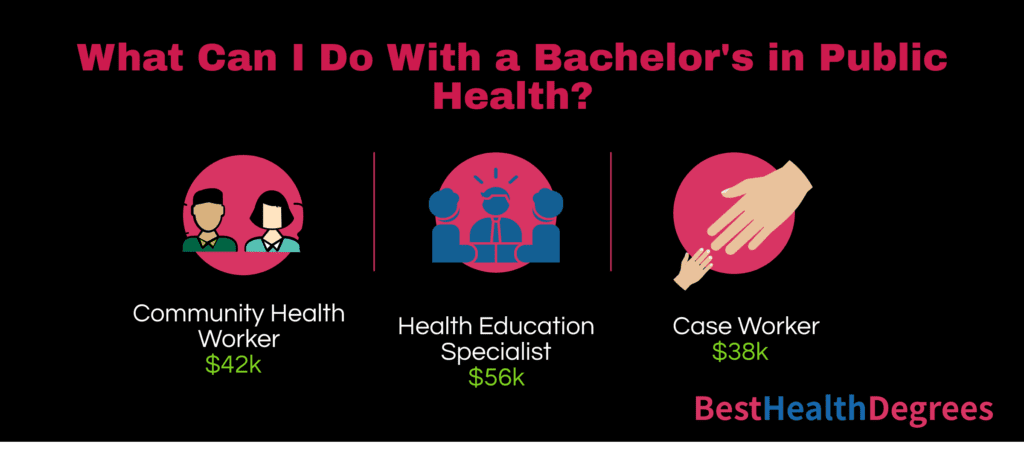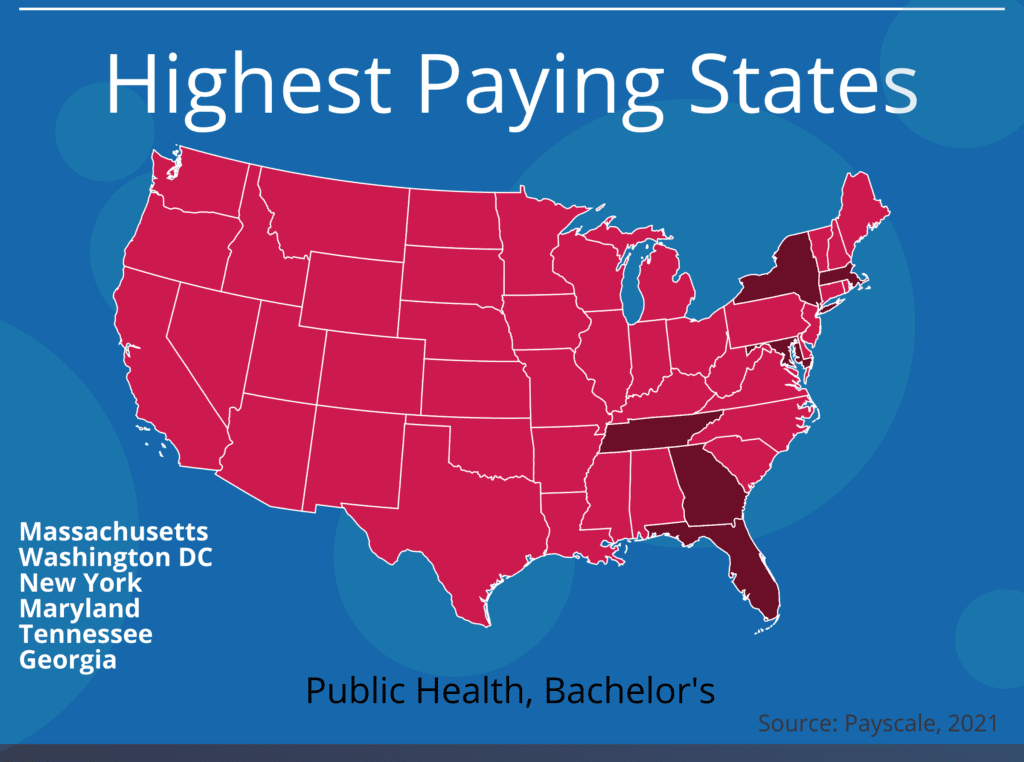Key Takeaways:
- A Bachelor’s in Public Health opens various career paths such as community health worker and health educator.
- Students pursuing a Bachelor’s degree in Public Health can specialize in areas like epidemiology, community health, and environmental health.
- It’s important to choose Bachelor’s in Public Health programs with CEPH accreditation, recognized for its high standards.
- Public Health bachelor’s degrees are available online, providing flexibility for students with jobs or family commitments.
- Salary prospects vary with a Bachelor’s in Public Health; specialists typically earn more than entry-level positions.
For those considering careers in public health, it’s important to understand the different types of public health degrees available. This article covers careers in public health, accreditations, and certifications significant to the field, and salary expectations for entry-level, midcareer, and advanced positions.
Is Public Health a Good Career?
Many prospective students wonder is a bachelors in public health worth it? There are a few things to keep in mind when evaluating whether a bachelor’s in public health can meet individual career aspirations.

First, it’s important to evaluate career goals and possible degrees that make those goals more attainable. Those searching for a steady career with plenty of growth opportunities might find that a public health degree helps them achieve their goals.
A bachelors in public health can open up many doors for students who want to make a difference and promote health in communities and whole countries. Those already working in the field or volunteering for public health outreach programs can attain advanced job titles and increase their salary with a bachelor’s degree and formal education.
Students should first consider their areas of interest since there are many specializations under the public health umbrella. Those who would like to work in the community rather than directly with patients might choose public health over fields like nursing or occupational therapy. Prospective students should consider the type of work that they would like to do and then match it to the public health specialization that could help them obtain an entry-level job.
There are many public health degree careers. Public health careers might include:
- community health workers
- health education specialists
- health and safety engineers
- public health nurses
- community service managers
A health and safety engineer, for instance, works to improve health outcomes by determining health and safety regulations, designing safety training programs, and more.
Students with full time jobs and family obligations may wish to consider careers in public health that allow them to get their degree online. Is public health a good career? Public health degree careers cover a wide range of territory from research and discovery to working directly with individuals, families and communities to promote health solutions.
Keep reading to learn more about choosing a school with the proper accreditation and career and salary expectations in this important field.
Accreditation for Public Health Programs
The CHEA Database lists 8,200 institutions with 44,000 programs that have been evaluated an accredited by third-party accreditation boards. Choosing an accredited college allow students to take advantage of certain benefits. It’s very easy to use the database. Students simply have to type in the name of the institution or state. The database will return the accredited programs and/or institutions that meet the search criteria. Students should avoid colleges and universities with no accreditation.
Regional Accreditation
Many employers and higher institutions look for colleges with regional accreditation. So, those who want to attend a master’s program or obtain a job in public health should carefully note weather a particular school has the proper accreditation.
Most online schools are regionally accredited, meaning they have met the gold standard of college accreditation. Schools with regional accreditation have higher prestige and are recognized by other accredited universities and discerning employers. This means that students will have an easier time getting credits transferred and having their degrees recognized if they pursue postgraduate studies.
Additionally, regional accreditation is often a prerequisite for tuition reimbursement plans and financial aid.
National Accreditation
The Council for Higher Education Accreditation (CHEA) partners with the US Department of Education to govern national accreditation agencies. National accrediting agencies do not have geographic limitations. Instead, these schools focus on specific vocational, career or trade schools and programs. Whereas regionally accredited colleges and institutions renew their accreditation every 18 months to three years, nationally accredited schools are reviewed every three to five years.
There are separate public health program accreditation boards that students should be aware of. The best undergraduate public health programs, for example, will have the CEPH accreditation.
How Important is CEPH Accreditation?
The best undergraduate public health programs have received accreditation from organizations that monitor public health programs. CEPH public health program accreditation Is typically recognized as the most prestigious criteria credential in the field.
The Council on Education for Public Health approves schools for the prestigious CEPH accreditation, which serves multiple purposes as follows:
- For the public, CEPH accreditation helps ensure the safety and welfare of society.
- For prospective students, this accreditation shows that schools and universities have met the stringent standards set by industry professionals.
- For prospective employers, CEPH accreditation proves that a school’s curriculum contains the essential skills and knowledge required by public health officials.
- For graduates, it provides universal acknowledgement of a high-quality education.
- For public health workers, this accreditation allows practitioners to have input into setting standards and modifying training to meet the needs of emerging public health crises.
- For the federal government, it sets the standard for participation in publicly funded programs.
- For the schools or programs, CEPH accreditation enhances peer recognition.
CEPH Accreditation Criteria
Who is eligible for CEPH accreditation?
- Public health Program (PHP)
- Schools of Public Health (SPH)
- Standalone Baccalaureate Programs (SBP)
For consideration for CEPH accreditation, a college or university must have achieved regional accreditation and provide a curriculum, called an initial application submission (IAS), that meets the high standards of this credential. The original review process takes three years.

Types of Public Health Bachelor’s Degrees
Concentrations vary from school to school but typically include these concentrations:
- Biostatistics
- Community Health Science and Practice
- Public Health Management
- Epidemiology
- Social and Behavioral Sciences
- Global Health
- Public Health Nutrition
- Environmental Public Health Sciences
- Public Health Policy
- Sustainable Development Goals (SDGs)
Should I Get a Bachelor’s in Public Health?
A public health bachelor’s degree trains candidates to evaluate and monitor health issues for groups and individuals. Attending a school of public health exposes students to introductory coursework in topics such as epidemiology, biostatistics, healthcare in the United States, and health education. Students with a public health major study both theoretical concepts, engage in laboratory practice and field work, and hold internships to gain experience.
A public health bachelor degree also prepares students for postgraduate programs in specialized fields. By offering seminars and other learning opportunities, public health programs teach students to engage in analytical thinking and how to craft effective research queries. Reputable public health bachelor degree programs offer in-class or online options for students seeking a robust public health bachelor curriculum.
What Is a Public Health Major?
With a public health degree, students can choose a sub-specialization that enhances their public health major. A public health major prepares learners to defend community health and individual well-being. This could include taking precautions against foodborne diseases, addressing low vaccination rates and working on programs to reduce drug overdoses.
With a BS in public health, graduates can work within their community or around the world. A public health degree is a great base for students who want to respond to outbreaks of disease and provide professional services that helps save lives. However, it’s not enough just to have a public health major. It’s also important to choose a school of public health with the appropriate accreditation.
With a BS in public health, students become attractive to employers. This challenging field requires a multidisciplinary approach and students have to learn not only public health administration but a number of concepts from other disciplines. Getting a degree in public health online allow students to learn about the political and bureaucratic systems that govern public health without attending classes in person. This could be key for students located in remote areas doing volunteer work or supporting their families.
Benefits of Online Public Health Degrees
A public health degree online provides the flexibility needed for working adults. Of course, an online degree in public health also provides a great deal of flexibility for students. Online public health degrees allow students to set their own study schedule and complete their work anywhere with access to the internet.
Further, a degree in public health online often has a clinical element that students complete in a traditional setting. This gives them hands-on experience in the field through internships and an opportunity to interact with faculty members who serve as mentors. Further, some public health degree online programs offer fully online courses.
An online degree in public health is ideal for working adults, those taking care of children or elderly family members and others in need more flexibility to complete their degree.
Many online courses are more affordable than on-campus options. Students often do not have to pay lab fees or other academic fees associated with on-campus study. Online study opportunities provide future public health professionals the opportunity to study no matter where they are located in the world. So, if students are engaged in outreach programs in remote areas, they can still complete their studies as long as they have internet access.
Certifications/Licenses in Public Health
There are many public health certification programs that can help graduates attain specialization in a particular area of interest. Some employers require public health certificates as a condition of offering employment to recent graduates or those with experience.
Those Certified in Public Health (CPH) hold the most widely recognize certificate of public health. The certificate is granted those with a master’s in public health who meet certification criteria.
The Certified Health Education Specialist (CHES) certificate in public health helps those who want to work in health education show that they have mastered certain concepts and skills value in this niche. The Commission for Health Education Credentialing, Inc (NCHEC) awards this credential. NCHEC also awards the Master Certified Health Education Specialist (MCHES) as a next level certification to those who already hold the CHES.
Another certificate of public health, the Certified Public Health Administrator (CPHA) designation is awarded by the Public Health Practitioner Certification Board. Students who have achieved this certification have met certain criteria crucial to the professional category.
There are many other certifications in public health, some of which apply to specific areas of practice. For example, a Certified Emergency Response Coordinator (CERC) applies to those interested in a career in emergency preparedness.
Other certifications for public health, such as the Certified Physical Activity in Public Health Specialist (CPAPHS), allowed graduates to show their proficiency in a particular niche of public health. In fact, the American College of Sports Medicine (ACSM) has several public health certification programs that cover in depth knowledge of college sports medicine. ACSM public health certificates Give students a choice in what area they would like to specialize in. Some students choose Certified Physical Activity in Public Health Specialist (CPAPHS).
Whatever certificate in public health students decide to pursue, it’s a good idea to check with potential employers in the field. This can save a lot of time and money by ensuring that students obtain a certificate of public health that will increase their area of practice and help them advance in their chosen career path.
Certifications in public health can sometimes help students who originally studied another field segue into the public health realm. Certifications for public health often include underserved populations.
What Is the Credentialing Process Like?
For some certifications, students must complete a bachelor’s degree from an accredited university. Other certifications require a master’s degree. It’s important for students to double check the criteria prior to applying to on-campus or online certification programs.
The various certification programs have specific competencies required in order to obtain the credential. typically, students take courses or fulfilled obligations for clinical hours to work towards their certification.
Once a student believes that they have completed all of the eligibility requirements for their certification, they can submit their request to obtain the certificate. Typically, the review board will ensure that each candidate passes the requirements and has taken any exams needed to qualify for the certification. Then, they notify the student that they have obtained the credential.
Some adults Already working in public health decide to take public health certifications in order to switch their areas of expertise.

Careers in Public Health with a Bachelor’s
There is quite a bit of variety in bachelors in public health jobs. While some students know exactly the type of work they want to do prior to enrolling in college, others have a more general idea that they would like to help people but aren’t sure what BS in public health jobs would most appeal to them.
Public health administrator jobs are typically out of reach for students with a newly minted baccalaureate degree in public health. However, those with experience in the field sometimes go back to school to finish their undergraduate degree to obtain positions of higher responsibility.
Bachelor of science in public health jobs include a plethora of specializations such as epidemiologist, field investigator or community health worker. Therefore, bachelors in public health jobs can be found in state, local and federal government agencies or private sector practices and foundations.
Those seeking public health administrator jobs often go on to postgraduate work after obtaining a few years of experience in the field. While BS in public health jobs include supervisory and managerial roles, some employers may prefer candidates to obtain certifications specific to their area of practice.
Bachelor of science in public health jobs include unique position such as government policy analyst, breastfeeding support coordinator, health department administrator or health care administrator. So, no matter what setting students see themselves working in, public health bachelors degree jobs can often accommodate their preferences.
Other public health bachelor degree jobs focus on information technology and education. Besides public health worker jobs, professionals in the field serve as health educators, health informatics specialist and health service managers.
Here are more examples of public health jobs students can attain with a bachelor’s degree:
- HIV/AIDS Educator
- How To Become a Counselor
- LCSW
- Medical and Health Services Manager
- WIC Nutrition Specialist
- Minority Health Office Administrator
- Refugee Coordinator
- Nurse Midwife
- Project Manager
There are great many different roles and responsibilities that graduates of public health schools can consider.
Salary Potential in Public Health
While public health salary ranges trend a bit lower than some professional fields, it’s possible to achieve higher salary ranges through experience, certifications and hard work.
Here are a few examples of average salaries in the field and the type of work involved. This is by no means a comprehensive list, merely a spattering of different specializations to give prospective students an idea of opportunities available in the field.
Occupational Health and Safety Specialist
According to the US Bureau of Labor Statistics, these professionals make an average of $73,000 per year. Occupational health and safety specialists examine environmental factors in a workplace to ensure that they meet government and industry standards. These professionals educate employers on ways to improve working conditions. They also collect data and create documentation to show whether an employer has meant the relevant environmental standards.
Epidemiologist
According to the BLS, epidemiologists make an average of $75,000 per year. This is one of the most popular specializations and involves the treatment and prevention of communicable diseases. Epidemiologists work within the community to develop health policies and decrease infection rates. These professionals collect data and help defend at-risk populations with forward-thinking health policies. Most epidemiologists go on to pursue a master’s degree or doctoral degree.
Nutritionist
The BLS estimates the average salary of nutritionist at $63,000 per year. Nutritionists educate individuals and communities about consuming healthy food. Nutritionists keep up with the latest research and create meal and exercise plans for individuals and communities. Many nutritionists have a bachelor’s degree and have also earned the Registered Dietitian credential.
Health Educator
These professionals earn about $48,000 per year and concentrate on educating the public, students, or other communities to lead health-conscious lives. Some of the topics they tackle include childhood obesity, sexually transmitted infections, healthy eating and domestic abuse. Students interested in this specialization may want to look into obtaining National Commission for Health Education Credentialing.
Healthcare Administrator
Healthcare administrators make an average of $104,000. it’s important for students to understand that there are higher positions of responsibility that can net them six figure jobs. Although these types of positions typically come after years of serving in other roles of responsibility, students who wish to increase their salary while helping others can aim for a career as a healthcare administrator. Many health care administration positions require some kind of state certification. So, it’s important for students to research the position that they want and work towards getting the necessary credentials and experience.
The range of public health salary typically depends on the experience, education and performance of public health workers. Public health specialist can often command higher salaries than those with general public health salary roles, for example.
A public health bachelor degree salary is typically higher for those working in the private sector then those working for government agencies. A bachelor of science in public health salary is also much lower than jobs available with a masters or doctoral degree. This is something for graduates at the baccalaureate level to keep in mind.
Some graduates want to pursue careers in mental health, nutrition and environmental issues. Money isn’t always the prevailing reason to go into a particular career. However, it is possible to make a good living in the public health sector without sacrificing the desire to touch individual lives in a positive way.

Professional Organizations
There are many organizations that can help public health workers network and keep their ear to the ground on upcoming jobs in the industry. For those involved in public health, joining professional organizations can help with finding mentors and getting career advice.
Here’s a list of the some of the popular professional organizations in the public health arena:
- American Association of Clinical Research Professionals
- American College of Epidemiology
- American Nurses Association
- American Public Health Association
- American School Health Association
- Association of Environmental Health Academic Programs
- Association of Occupational and Environmental Clinics
- Association of Public Health Laboratories
- Association of Schools and Programs of Public Health
- American Society for Microbiology
- National Environmental Health Association
- Society for Public Health Education
Public health organizations often provide certifications in public health specializations and niches. Many professionals remain in organizations that promote public health in general or their area of expertise. These organizations often have publications or websites that help members stay on top of the latest developments in the field.
Related Rankings:
- 25 Best Public Health Bachelor’s Programs
- What Can I Do With a Public Health Degree?
- 15 Best Online Bachelor’s in Public Health
- 10 Fastest Online Bachelor’s in Public Health
- PhD Jobs in Community Health Education
- What Jobs Can You Get With a Health Science Degree?
- What Can I Do with a Bachelor’s in Nutrition?
- Best Types of Counseling Degrees
- Kinesiology and Exercise Science Salary
- What Can You Do with a Human Service Degree?
- CNA Degree and Educational Guide
- What Can You Do With a Master’s in Psychology Degree Program?
- 10 Cheap MSN Online Programs